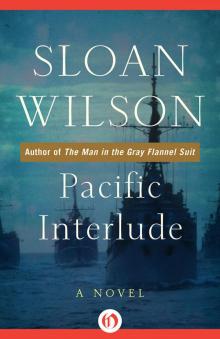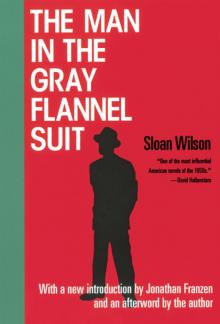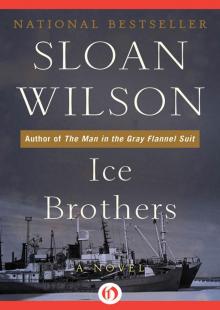- Home
- Sloan Wilson
Ice Brothers Page 16
Ice Brothers Read online
Page 16
“Good God,” Nathan said to Mowrey, who was taking a bearing on the entrance to the fjord, “I don’t know whether it looks like heaven or hell, but it sure doesn’t look like any earth I’ve ever seen.”
“Do you know what it looks like to me?” Mowrey asked, lighting the stump of his cigar. Before waiting for a reply, he added, “The entrance to that fjord looks like the biggest damn cow’s cunt I ever seen.”
Nathan winced, angry at himself for giving Mowrey the satisfaction of shocking him. “Well, captain, I guess that’s one way to look at it.”
As his days of idleness passed, Nathan began to feel more and more guilty about his status as little more than a passenger aboard the ship. He had read all the textbooks on navigation and seamanship he could find and was quite capable of using the bubble sextant, but Mowrey wouldn’t let him near the chart table to plot his lines of position. Nathan was so hungry for some useful work that he rushed to help Boats and a gang of deckhands when they were picking up a crate of dried fish that had broken and spilled onto the deck. As Nathan used his bucket to help shovel the fish into burlap sacks, Boats put a heavy hand on his shoulder.
“Sir, don’t you know that officers ain’t supposed to do work like this? This is my job.”
Finding himself apologizing for trying to be useful, Nathan ambled aft and stood by the depth charges on the stern. Seasickness had been the worst physical agony of his life, but at least it had acted like a drug to dull other pains. The grumbling of the propeller shaft under his feet and the seagulls swooping over the bubbling wake astern suddenly reminded him of the Staten Island ferry, aboard which he and his wife had often ridden during their brief marriage.
Becky. For two years now he had, for the sake of his own sanity, tried not to think of her any more than possible, and he still never talked about her to anyone. They had had only nineteen months together before she had gone to Poland to get her parents. In the two and a half years that had followed, Nathan’s grief had taken many forms. After having been forced to realize that there was no way to get information about her, he had tried to join the Canadian air force. Unable to pass the rigid physical examinations, he had accepted an offer to work on defense contracts at General Electric.
Immediately after Pearl Harbor, he had tried to join first the navy, then the marines and finally the Coast Guard. The idea of going to war to win personal revenge against the Nazis had struck him as futile, but still compelling. War was disciplined hatred, after all, and who had reason to hate the Nazis more than he? Despite his distaste for melodrama, he had imagined himself using his knowledge of electronics to sink Nazi battleships, landing in France and striding across Europe to rescue his wife.
Instead, he had landed aboard a trawler in Greenland where he was considered too ignorant and inept to give a simple order to the helmsman. And instead of working, however indirectly, to defeat the country which had swallowed his wife, he was spending weeks on end as a passenger, admiring the beautiful scenery. The fact that he at times found himself enjoying his leisure and his fantastic surroundings made him feel more guilty than ever.
About ten days after leaving Narsarssuak Fjord, however, Nathan did find a job for himself. It began when Sparks came out of the radio shack and said, “Sir, I’m picking up a message that might be from the Nanmak, but they’re sending it in Morse much faster than I can read it. Do you want to see if you can get it?”
Since the age of fifteen, Nathan had been a ham radio operator, and he had no trouble in jotting down the coded signals. He was so curious about the activities of the Nanmak that he hurried to decipher them as though they were an urgent message for his own ship.
The message was addressed to “Commander GreenPat” and was from Hansen. The first part of it had been sent before Nathan had been called to the radio shack and was not repeated, despite the fact that heavy static made reception difficult. The message was sent as fast as possible and kept as brief as possible to give as little help as possible to radio direction finders aboard any German ship in the vicinity, Nathan realized. When deciphered, the message said: “… visibility almost zero. Proceeding slowly through heavy ice. No radio activity detected. Have discovered, however, four red marks on ice which look like copper antifouling bottom paint. Deduce that some ship has been this way since last snowstorm. A course of zero four eight brings us from first of these marks to others, which were discovered in circular search pattern. One soft flat berg has been ploughed through, leaving channel sixty-two feet wide indicating passage of ship much bigger than trawler. Probably icebreaker making much better speed than us, but am tracking.”
Nathan wondered how it must feel to be a hare tracking a hound. If fog continued to reduce the visibility to zero and if the German had functioning radar, he would locate the Nanmak long before Hansen could see him. Perhaps the rush of incoming shells would be the first proof Hansen would get that the Germans were nearby. If only I were there, I probably could get that old radar set going for a little while and could at least give Hansen a chance to maneuver, Nathan thought. He was surprised and pleased to discover that he genuinely wished he were there. The thought of dying did not bother him anywhere near as much as the knowledge that he was useless in this battle that he wanted so much to fight.
Going to the bridge, Nathan found Mowrey standing beside Paul while he shouted orders to the helmsman.
“Captain, I copied a message from the Nanmak to GreenPat,” he said. “We’re not involved, but I thought you might want to see it.”
Mowrey took the clipboard from his hand and quickly read it. Handing it to Paul, he said, “Looks like Wally is making himself into a hero. That little bastard always was smart. I bet he’s holed up in the ice pack drinking that Aquavit of his and dreaming up all kinds of messages to make himself look good. One thing you can count on is that Wally Hansen ain’t going to catch up to no Kraut icebreaker. He’s too smart a squarehead for that.”
When Paul read the message he couldn’t deny his first feeling was gratitude that he was safe on the west coast of Greenland, instead of aboard the Nanmak. Which undoubtedly meant that he was a coward. But he couldn’t feel too ashamed of that. After all, he had Mowrey. Who was to say which was more dangerous—a mad dog or a German?
“Keep copying anything sent to or from the Nanmak,” Mowrey was saying. “I want to see what stories Wally invents next to keep Headquarters happy.”
CHAPTER 17
The Arluk’s first port of call was Godhavn, which Mowrey hoped to reach in about a week, but it was more than two weeks before they wove and bucked their way through the ice pack to that rock-rimmed harbor. As they approached a low stone wharf, a flotilla of kayaks surrounded them, and a crowd of fur-garbed Greenlanders lined the shore.
“Let’s give them a show,” Mowrey said, and began tooting the air horn, which had sounded insignificant in Boston, but which echoed off the surrounding hills of Godhavn with satisfying authority. The natives seemed impressed.
“Flags, flash the searchlight,” Mowrey said. “Guns, see that growler over there?”
“Growler, sir?”
“For Christ’s sake, a growler is an iceberg so small it’s awash in any kind of sea. See it? Try to hit it with the starboard twenty-millimeter. There ain’t nobody you can hurt over in that direction.”
“Aye, aye, sir,” Guns said with enthusiasm. He always loved to fire the gun, and never before had he had an audience of civilians.
The Eskimos were startled when the big twenty started its rapid barks and directed a fiery arc of explosive shells at the blue mound of ice floating near the entrance to the harbor, but realizing suddenly that this was a show for their benefit, they jumped up and down in more lively fashion than ever, shrieked their laughter and clapped. Egged on by the enthusiasm of his audience, Mowrey stopped the ship and turned her enough to bring the three-inch gun on the bow to bear on the target. The gun crew loaded and fired as rapidly as they could, and though the shells missed their target by twenty-fiv
e yards, the short cannon made a satisfying series of explosions which echoed through the surrounding mountains.
“Give them a star shell,” Mowrey said.
The sun was low enough in the sky to make the burst of the star shell brilliant against the opposite horizon, a display spectacular enough to make a fitting climax to the show.
“That’s enough now,” Mowrey said. “Mooring stations!”
As the first lines were secured to the wharf, Mowrey continued to tutor Paul. Because the tide here could fall thirty feet and because ferocious squalls often swept Greenland harbors, where the cold air from the ice pack met the warmer waters from the Gulf Stream, the normally simple act of tying up a ship was something of an art. While the deck force labored to double up their longest and heaviest dock lines, almost everyone else aboard the trawler changed into their best uniforms for a night ashore. The liberty party was assembling on the well deck, where they joked with Eskimos on the wharf, when a tall, thin old Dane approached the ship. His appearance was startling because he wore a gray business suit and a spiffy Chesterfield coat which looked as though he belonged in London or Boston, not in a crowd of fur-clad Eskimos. In heavily accented English he asked whether he could talk to the captain and Mowrey jovially beckoned him to the pilothouse. Soon they disappeared into the captain’s cabin and Flags was dispatched to bring ice cubes, a commodity which Mowrey never used.
They did not stay in the cabin long. When they came out Mowrey no longer looked jovial, and the Dane hurried quickly ashore.
“Bring the men to quarters,” Mowrey said to Paul. “I got to talk to them.”
Paul passed the word and soon the shrill whistle of the boatswain’s pipe sounded. The men who lined up on the well deck looked entirely different from the crew to which Mowrey had read his orders in Boston. Primed for liberty and disciplined by almost two months with Mowrey, these sailors stood at attention like a well-drilled company of marines. Even Nathan, who was looking forward to visiting a native settlement, had put on a well-pressed uniform and stood rigidly at attention. Only Farmer had remained himself. In his old khaki parka, he leaned against the winch and smoked his pipe.
“At ease,” Mowrey said as he stood in front of the men. He had put on his blue uniform with the four rows of campaign ribbons and his short, improbably black hair was slicked down under his sealskin overseas cap, but he himself did not look at ease and his voice for the first time sounded unsure.
“Men, I have bad news,” he began. “That Dane who came aboard is the bistera or governor of this place. He says they’ve had trouble from the crews of other ships and the Danes have passed a law for all Greenland. Nobody can go ashore here except on official business.”
A loud collective groan came from the crew.
“Sorry, but I can’t do nothing about this,” Mowrey continued. “Too much army and too much navy is up here these days, not right here, but farther south. Too many Eskie girls got knocked up and got the clap, so now we’re all restricted by order of the Danish government and our government backs them up. If I let you go ashore, it’ll be my ass.”
“Can’t you find some official business for us?” Boats asked.
“The Eskies are going to carry supplies themselves—all we’ll do is set their stuff on the wharf. Best I can do is set up a beerbust for you on the wharf, but the governor is going to make all the Eskies clear out first.”
More groans.
“Farther north things may be different,” Mowrey continued. “The law is the same for all Greenland, but there are places where there will be no Danes to watch us. I feel for you men and you can be sure I’ll do everything I can for you. Dismissed.”
Before the men could engage him in conversation, Mowrey headed for his cabin. “Come,” he barked at Paul.
After closing the door of his cabin, Mowrey sat on the edge of his bunk and Paul perched on the stool before the chart table.
“Of course what the man really said was, the officers could go ashore, but not the enlisted men. The Danes are throwing a shindig for us. Want to go? It will be official business.”
Paul, feeling guilty, said he would.
“That farmer can’t go because he ain’t a commissioned officer and I don’t want that Greenberg along. Not tonight. Just tell them you got official business.”
“Mr. Farmer never seems to want to go ashore much, but I know that Mr. Green is looking forward—”
“I don’t want no Sheenie with me. There will be a dinner and a dance and God knows what. You can’t tell what that Sheenie would do. Anyway, I can never relax with him.”
Paul said nothing, silence being the strongest show of protest he could make. The thought that Mowrey could not relax with Nathan after vilifying him for weeks fascinated him. Somehow that feeling was understandable, even reasonable, for although Nathan never replied to the insults heaped upon him, there was such contempt in his deep-set eyes whenever he looked at the captain that relaxation would have been difficult.
Mowrey left to Paul the job of telling Seth and Nathan that they would not be permitted ashore. Seth had already started to write one of his endless letters to his wife and did not appear to mind, but Nathan was studying a brief vocabulary of Greenlander words which he had found in one of his books.
“Sorry,” Paul concluded. “To be honest, the skipper said he can’t relax with you. I’ve been trying to figure out what the horrible meaning of that is.”
“The offender never forgives,” Nathan said with a wry grin. “Hell, I couldn’t relax with him. If this is just going to be some kind of a party the Danes are giving for him, I’d just as soon not be there.”
Holding his list of Eskimo words, Nathan went to the well deck and leaning on the rail, smiled and said something which sounded like “Oskos” to a row of Greenlanders who were solemnly admiring the ship. Apparently it meant “Hello.” They immediately grinned and crowded as near to him as they could, laughing and talking in a combination of three languages—their own, Danish and English. Their blood, Paul observed, was as mixed as their speech. A few of the people on the wharf were the short, solid, copper-colored Orientals of the north, but despite the fact that they all wore fur clothes, some looked Scandinavian, and others represented every possible mixture of the two races. In their laughter and their enthusiasms, they were all pure Eskimo as they pointed to the sky, the wharf, the ship, the sea and articles of their clothing to give Nathan the proper words. And Nathan’s craggy face, which seemed permanently cast in lines of melancholy and sorrow, reflected their humor and their joy. His interchange with them came as a relief after the constant bawdiness of the captain and the crew whenever they came into contact with Eskimos.
Seth came forward to supervise the opening of the hatches and the unloading of supplies. To save space the crates and boxes had been fitted into the hold like a huge jig-saw puzzle, without much regard for putting the crates designed for the first port of call on top. When Mowrey, who was watching the operation from the gun deck, realized that everything in the hold had to be rousted out and examined to find the pieces assigned to this place, he said, “Mr. Farmer, you can’t throw supplies into a hold the way you throw mackerel into a fishboat. When are you going to look at that uniform you’re wearing and realize that you’re in the Coast Guard?”
For the first time Mowrey’s criticism flustered the old fisherman. His face turned a deeper shade of russet red and he stuttered a little when he said, “Sorry, sir. I j-j-just do the best I can.”
Ordinarily Mowrey would have given Paul hell for the inefficient stowage of the cargo, on the theory that the executive officer was responsible for whatever went wrong aboard the ship. The shifting of his wrath to Seth, in addition to his recent efforts to teach Paul as much as possible about the running of the ship, made Paul realize that his status had changed or was in the process of changing from scapegoat to protégé. Perhaps his being chosen as the only officer allowed to go ashore that night with the captain was further proof of that. The th
ought filled Paul with strongly contradictory emotions; relief, renewed ambition, pride in learning to do his job well, and also a disturbing sense of disloyalty to the others, especially Nathan. In the unending war between the captain and the other officers, he had always felt one with Nathan and Seth. Now was he supposed to change sides?
Although it was six-thirty in the evening when the captain and Paul went ashore, the sun was still high in the sky. As soon as they walked off the wharf and around a stone warehouse on the shore, a great many Eskimo dogs began to bark, and soon they were surrounded by a pack of about thirty of them, which growled and bared their fangs with all the ferociousness of a pack of wolves about to attack. Paul, who had never been afraid of dogs, was terrified as one huge gray beast with eyes that looked yellow pressed forward and snapped its great jaws only a few inches from his ankles.
Paul tried to say something soothing, and he put his hand out to pat the snarling animal.
The big dog crouched for a spring and was about to take off Paul’s hand when Mowrey exploded.
“Back off, you sons of bitches!” he roared, and to Paul’s astonishment, growled and roared more like a lion than a man.
The dogs cowered and retreated a few yards, but formed a circle around them. Mowrey stooped, and though there was no small stone in the frozen mud under their feet, he straightened up with an exaggerated pantomine of throwing and gave more roars. The pack of dogs turned tail and ran.

 A Summer Place
A Summer Place Pacific Interlude
Pacific Interlude Man in the Gray Flannel Suit
Man in the Gray Flannel Suit Ice Brothers
Ice Brothers